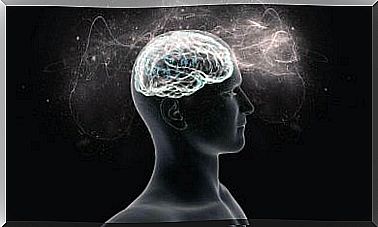Why Is It So Difficult To Control What We Think?

“Whatever you do, don’t think of a blue cat . ” Why is it so difficult to control what we think? 99% of us do it, we visualize almost instantly that blue cat, the pink elephant, the polar bear and each sheep that we count to overcome insomnia. Because the mind is like that, an incessant factory of thoughts and images, of memories, obsessive and even irrational ideas.
It never ceases. It never closes for holidays and a break is rarely allowed, even for health reasons. Thus, whoever wants to quit smoking, for example, will find it difficult to remove the image of the tobacco pack, of the incessant desire to light a cigarette. It is also difficult for those who have just been abandoned by their partner and make an effort at all costs to erase so many experienced memories from the brain.
We would love to be able to stop that flow of thoughts like someone closing the light switch. However, if we could achieve such mental engineering we would no longer be human; we would be machines. Because everything in the mental universe has an end and a purpose. Understanding its mechanisms is what undoubtedly gives us authentic wisdom.
We analyze it.

Why is it so difficult to control what we think
Something we know from the field of psychology is that controlling our thoughts is key to reducing discomfort. Anxiety states and depressions, for example, feed in most cases of an erosive mental state. However, one fact must be made clear: it is not easy to master what we think.
It is not enough to tell someone that “start thinking positively now” for things to work. Moreover, something that a study by the University of South Wales reveals is that sometimes, even when we believe we have mastered our mental approach, there are still “loopholes”. It is as if we were trying to submerge a ship in the depths and soon the remains of the bow, the masts or the keel emerged.
Now, why does it happen? Why is it so difficult to control what we think?
Our thoughts have deep roots
Thoughts are not just energy or the result of an electrical connection between our neurons. Each thought actually starts from a deep structure, as a result of our personality, experiences, education, attitudes, etc. Likewise, there is another fact, and that is that each person carries a specific pattern of thought almost from childhood.
Some are used to using a more open, optimistic and reflective mindset. Others, on the other hand, tend to be defined by looking at the world from helplessness or distrust since childhood. Therefore, it is not easy to master what we think because we have been “thinking the same way” for many years.
Behind every thought there is an emotion
If we ask ourselves why it is so difficult to control what we think, there is an aspect that we may be forgetting. Behind every thought there is an emotional state. We cannot say to ourselves that “I’m going to stop thinking that everything is going to go wrong” , if in fact my spirits are on the ground.
Every careless emotion persists and alters our thinking. If we put aside our emotional pains, disappointments, fears, resentments or despair, it will not do any good to take care of or attend to the ideas that pass through our minds.
The rebound effect of Dr. Wegner
Daniel Wegner was a social psychologist at Harvard University who wanted to delve into the question of why it is so difficult to control what we think. He found that in many cases what is produced is a rebound effect. That is, it is enough to want to submerge or block an idea so that it “makes a greater force” that opposes our wishes.
What one longs to hide in the world of the unconscious, it drives back to the conscious mind. Thus, and beyond the curious or anecdotal, there is a fact of great importance that is key to therapeutic success. The first step to control what we think is to accept everything that is happening in our mind.
Obsessive, negative, or irrational ideas should be accepted and not silenced. The right thing to do is to give it a presence and not hide it. Only in this way will we understand them, know what they are made of and manage the emotions that accompany them.
Why is it so difficult to control what we think? Because we are our worst judges
“I know that I must start to see things differently. I know I should have a more positive, hopeful and not so rigid approach. But it’s impossible for me and not getting it frustrates and angers me because it’s clear that I can’t handle anything, that everything surpasses me, that I’m an absolute disaster… ”.
People are our worst judges and we often feed an internal dialogue that is as negative as it is invalidating. By judging ourselves we further reinforce the presence of these thoughts and with this mechanism we increase anxiety.

How do we start to control our thoughts?
Why is it so difficult to control what we think? First of all, because no one has taught us how the mind, brain, and emotions work. Moreover, if there is something that we learn from very early on, it is to repress what hurts, to criticize ourselves when we cannot control those ideas, to get angry with ourselves when the penalties do not clear or the worries are reduced.
If we want to have a better command of our mental flow, we must visualize a movie screen. The first step to exerting control over what happens in our mental universe is to see each thought from afar, as if they were on a screen.
We will do it without judging ourselves, without criticizing ourselves. We must accept and give presence to every irrational thought to every obsession, fear or concern.
- We cannot stop thoughts, but we can observe them.
- By observing them, we allow ourselves to understand where they come from, what motivates them and what reinforces them.
- By understanding them, we can control them.
- A thought cannot be hidden or repressed, but we can substitute them (for example, I can change “I won’t be able to do that” to “I’ll try to see what happens”).
To conclude, as is well said, there is only one way to defeat monsters and that is by accepting their presence. It is true that they scare, that they are uncomfortable and that they seem to have unusual power. However, thoughts, like the worst enemies, can be controlled from serenity and intelligence. Accepting that they are there is the first step towards wellness.









